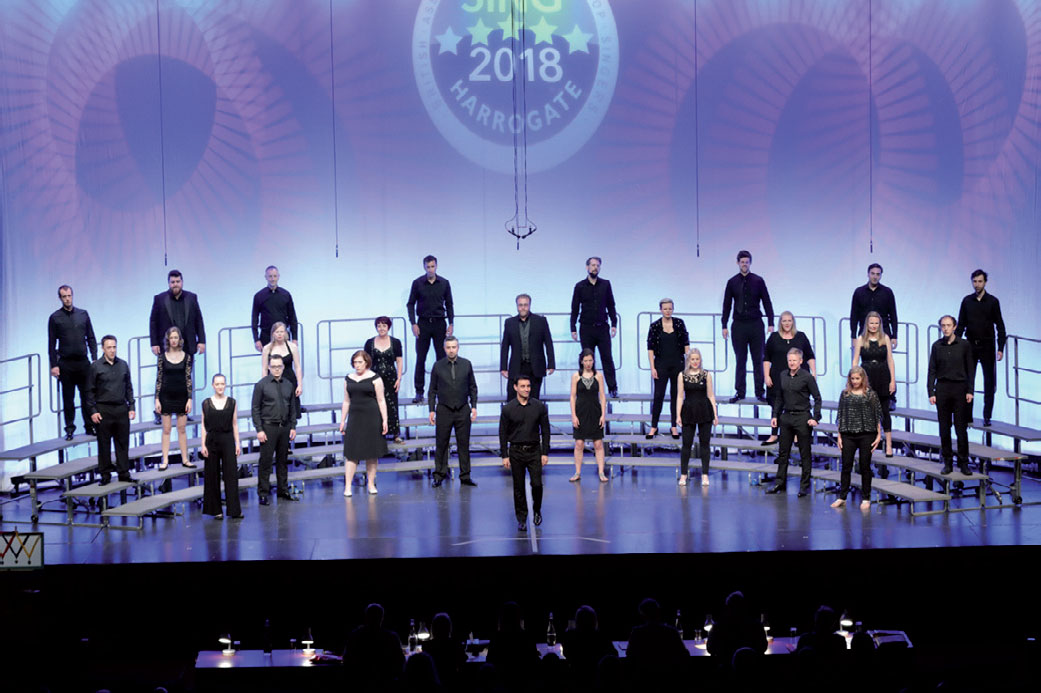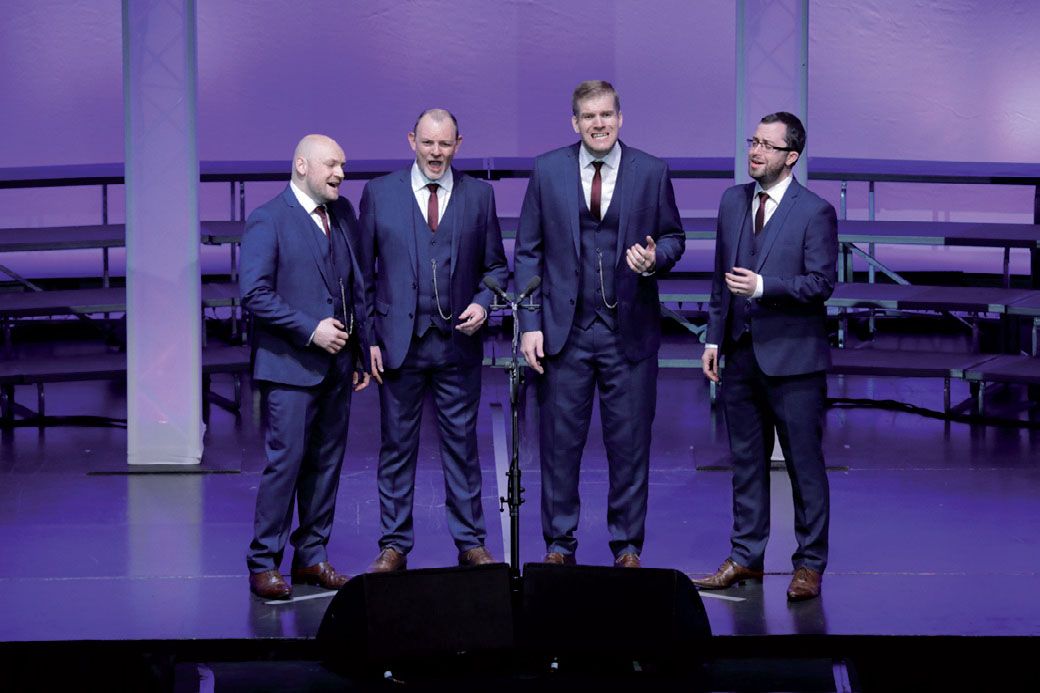
In the Friends episode ‘The One with All the Jealousy’, the character Ross hires a barbershop quartet to visit his girlfriend Rachel at her new office. The group reflects popular understanding of what barbershop looks and sounds like: an all-male quartet, dressed in striped suits and wearing straw boaters. However, although some barbershop singers do wear the vaudeville dress, most have done away with the staid sartorial style. And – shock, horror! – women can sing barbershop, too.
As this issue goes to press, the British Association of Barbershop Singers (BABS) will be preparing for its 45th convention, where over 2,000 people will flock to Bournemouth for Sing 2019. In June, dozens of quartets will head to Birmingham for the Ladies Association of British Barbershop Singers (LABBS) qualifying round for a chance to compete in the annual convention competition. There are also several international associations who have large numbers of British members of all genders. ‘It's a common misconception that barbershop singing is for men,’ says Alan Hughes, BABS music services director. ‘There are actually more female barbershop singers than male ones.’ LABBS began in 1976 with a handful of members and now supports over 50 clubs. ‘Wives saw their husbands enjoying BABS and decided they could do it too,’ explains Debi Cox, LABBS education officer. LABBS and BABS are discreet organisations, although they do work together, hosting a joint European convention in 2017.
Barbershop singing developed alongside jazz, gospel and operetta, and was a integral part of African-American folk music at the end of the 19th century. It was a popular element of the unsavoury minstrel performances, parodied by white musicians who went on to infuse it with their own traditions. As black barbershop groups were rarely recorded, the sound become associated with the white musicians, which reinforced the idea that this was white music. Societal segregation sadly continued, as the US Barbershop Harmony Society – founded in 1938 – was open only to white men (and became a mixed-gender organisation in 2018). The younger UK-based associations are mindful of barbershop's heritage and history. ‘We have a policy on diversity and we are very aware of the challenge of broadening the barbershop community,’ says Cox. ‘We're keen to ensure that BABS is open to all,’ adds Hughes.
The resurgence in interest in barbershop groups is part of a wider trend towards a cappella (unaccompanied) singing, spurred on in the last decade by American TV shows such as Glee and recent Pitch Perfect film series, which follows US college a cappella group the Barden Bellas through various ‘aca-amazing’ exploits. A cappella singing is firmly embedded into US culture both on and off screen: American groups have historically dominated international barbershop competitions, but, according to Hughes, ‘the Brits are getting better – we made the top twenty recently.’ In 2013 a UK female quartet rose from ninth to fourth, eventually placing third in 2015 at the US Sweet Adelines International convention, the highest-ever UK placing in an international contest.
It was only when competitions came into being that guidelines were drawn up to differentiate barbershop from other types of a cappella and to secure the genre's identity. In barbershop singing, the vocal lines run more or less in synchronisation, primarily in thirds, creating a closely knit homophonic texture. In contemporary a cappella, the parts weave in and out, regularly layering over each other to form a complex polyphonic structure. Both types of singing employ unusual vocal timbres such as bass colours or falsetto, but you're more likely to hear modern techniques like beat boxing and rap in a cappella.

BABS’ 2018 Sing convention was held in Harrogate. Momentum
‘Barbershop can be considered a subgenre of a cappella,’ explains Hughes. ‘What makes barbershop different is the prominence of the dominant seventh chord. We call that the “barbershop seventh” – a major triad, with a dominant seventh on top. We combine that with chord patterns that work around the circle of fifths – 3 6 2 5 1 – the combination makes really satisfying harmonies. All parts generally sing the words at the same time [known as homorhythmic].
‘We're also looking for something called “lock and ring” which is where overtones occur over chords. In great barbershop singing, the notes blend perfectly to create this, especially when there is a predominance of major seventh chords. It can sound so pleasing, in spite – or rather, because of – the in-built dissonance.’ At barbershop competitions, the technical elements of the singing is judged alongside the arrangement, musicianship and the performance itself, which often includes some theatrical touches. ‘You're more likely to see sequins than straw boaters these days,’ says Cox.
The style is becoming popular with music teachers, although Hughes, who is a secondary school music teacher, advises that it's probably best suited to Key Stage 4 and above. ‘It's never too early to start singing in harmony, though,’ adds Cox. ‘Rounds are always a good place to start.’
The move towards mixed-gender barbershop choirs has meant that traditional SATB choirs are experimenting with barbershop singing. There are several resources available, including learning tracks which are recordings with the volume turned up louder on particular parts. ‘Sweet Adelines has some resources for young female groups, as the standard barbershop music can go down to the E flat below middle C, which is too low for most young voices,’ says Cox. Repertoire and support can also be found on LABBS and BABS websites (labbs.org.uk; singbarbershop.com).

The Locksmths (right) were just two of the groups taking part
BABS holds two big educational events a year: Harmony College, which is held over the August bank holiday, is a three-day residential weekend for around 300 delegates, and takes place at Nottingham University. There is also an academy for choir directors, which takes place in January. ‘BABS has an open competition that takes place every November,’ says Hughes. ‘We invite any quartet with members aged 25 and under who fancy giving barbershop singing a go.’ Both BABS and LABBS have youth quartet competitions, and both associations have begun working with university clubs.
Barbershop singing can be assessed like any other music performance. ‘When I did GCSE and A Level Music, all my ensemble performances were barbershop singing,’ says Hughes. ‘I've always had a love of music; I play violin and trombone, and later picked up guitar and bass, but it was singing barbershop with my dad that really got me into it.’ Chris Fish, a secondary school music teacher and founder of Barbershop-o-gram credits his sixth form teachers for fostering his love of barbershop singing. ‘It encourages students to really listen to what is going on around them in a choral setting. To sing it well you need to know how your part fits within the harmony and to blend your sound with those around you,’ he says. ‘It's also an opportunity to perform songs with humorous lyrics!’
Barbershop-o-gram provides pop-up performances and bespoke songs for special occasions. It came into being when Fish was asked whether he would provide a quartet for a friend's hen night. The performance was so well received that the group became a permanent ensemble, expanding to comprise 12 singers who compose and arrange songs for a variety of clients.
‘Our first big gig was as the “Quidco Quartet” in a TV ad,’ remembers Fish. ‘Other highlights have included our BBC appearances: singing while on exercise bikes live on Radio 1 for Sports Relief; delivering a message to HMRC for The Revolution Will Be Televised; and singing political lyrics to Christmas carols on This Week. We've also sung “Happy Birthday” to acclaimed author Judith Kerr, and jumped out of a giant vending machine for Nectar Points!’ Barbershop singing is a flexible medium that's here to stay – both on and off the stage. As Deke Sharon, the prolific arranger behind Pitch Perfect, describes it, barbershop truly is the ‘black belt of a cappella’.








